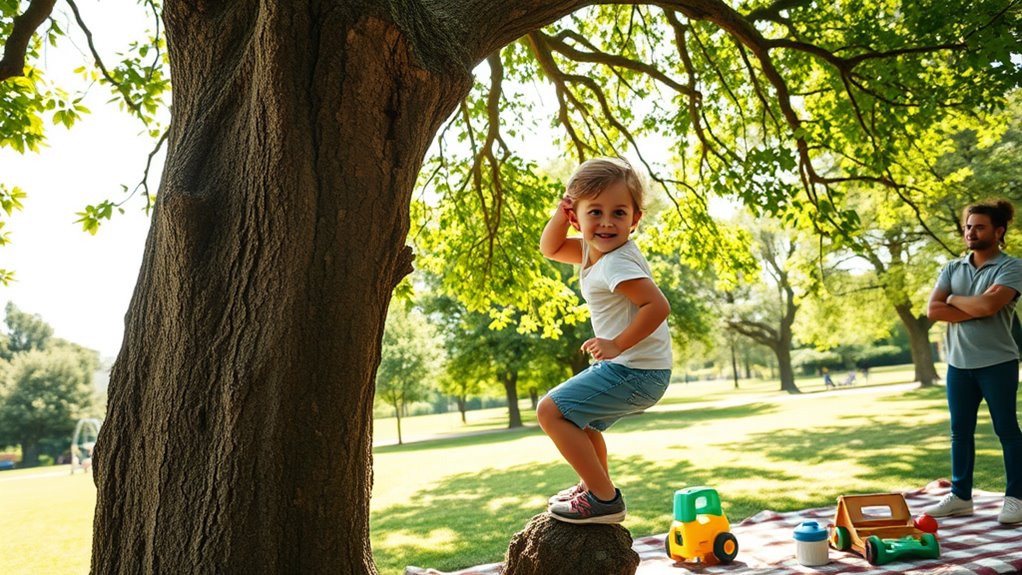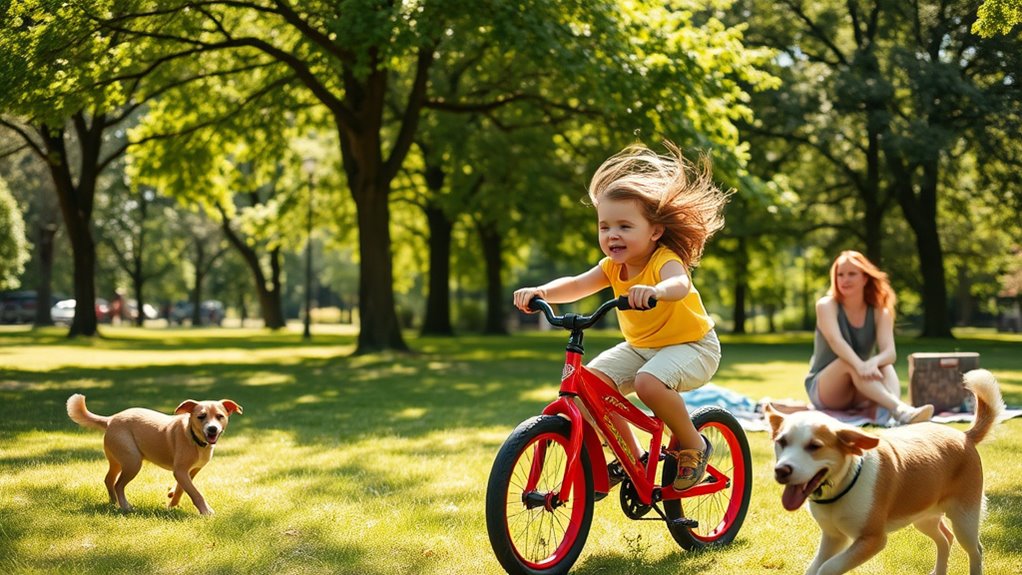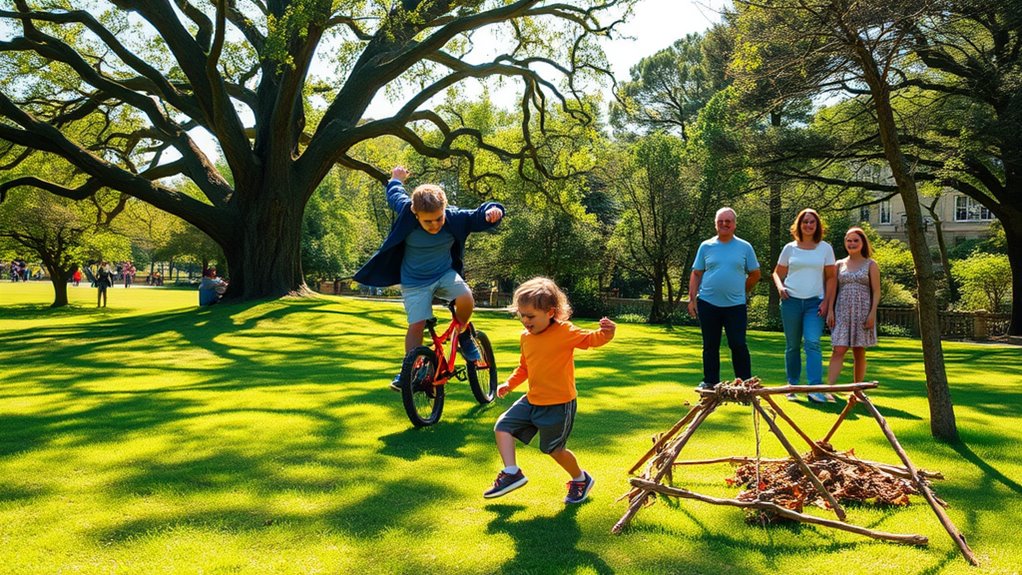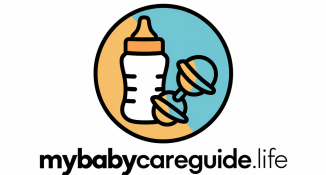The Principles of Free-Range Parenting
Free-range parenting invites kids to explore independently, which builds their resilience and problem-solving skills. You encourage this by assigning age-appropriate responsibilities, promoting choices, and guiding problem-solving. It’s all about balancing freedom with safety; you set clear boundaries while teaching kids how to handle emergencies and navigate social situations. As they face the consequences of their decisions, they learn accountability and self-reliance. Real-life examples, like walking home alone or exploring parks, highlight the positive outcomes of this approach. If you’re curious about practical ways to implement these principles, there’s a lot more to discover.
Understanding Free-Range Parenting

Free-range parenting, while often misunderstood, embraces a philosophy that encourages children to explore the world independently. This approach prioritizes trust, allowing kids to learn from their experiences rather than shielding them from every potential risk.
You might wonder how this works in practice. Fundamentally, it’s about giving your child the freedom to make choices, solve problems, and develop resilience. Instead of hovering, you step back and let them navigate challenges on their own.
By fostering this independence, you’re helping your child build confidence. You’re teaching them that they can handle setbacks and learn from mistakes, which is an essential life skill. It’s not about neglect; it’s about balance. You’ll still provide guidance and support, but you’ll also encourage your child to take calculated risks, fostering a sense of responsibility.
You may face criticism or misunderstanding from others who believe that children need constant supervision. However, as a free-range parent, you know that letting your child explore can lead to amazing growth and self-discovery.
Encouraging Independence

Encouraging independence in your child is essential for their development. It helps them build confidence and develop problem-solving skills. One way to foster this independence is to give your child age-appropriate responsibilities. Start small; tasks like setting the table or organizing their backpack can be great first steps. These little chores teach them accountability and help them feel capable.
Additionally, allow your child to make choices. Whether it’s picking out their clothes or deciding what snack to have, giving them options empowers them. This not only boosts their decision-making skills but also allows them to express their individuality.
When your child faces challenges, resist the urge to swoop in and solve everything for them. Instead, guide them through the process by asking questions that encourage critical thinking. This approach helps them learn resilience, showing them that it’s okay to struggle before achieving success.
Lastly, celebrate their accomplishments, no matter how small. Recognizing their efforts reinforces their sense of independence and encourages them to tackle new challenges with enthusiasm.
Fostering Self-Reliance

As your child grows, fostering self-reliance becomes essential for their overall development. Encouraging them to tackle challenges on their own helps build confidence and problem-solving skills. Start small by giving your child responsibilities appropriate for their age. For example, let them choose their clothes, help with chores, or prepare a simple meal. These tasks may seem minor, but they lay the groundwork for greater independence.
Allow your child to make decisions and occasionally face the consequences of those choices. If they forget their homework or mismanage their time, it’s a learning opportunity. Support them in reflecting on what went wrong and brainstorming solutions for next time. This process teaches accountability and resilience.
You can also encourage self-reliance by providing opportunities for exploration. Let them play outside with friends, join a sports team, or pursue hobbies. These experiences foster independence and help them learn to navigate social situations.
Balancing Safety and Freedom

Finding the right balance between safety and freedom is a key aspect of raising independent children. You want your kids to explore the world, but you also want to guarantee they’re safe while doing it. Start by evaluating the risks in different situations. For example, letting them walk to a nearby park alone can be a great way for them to gain confidence, but you should first check the route, traffic, and any potential dangers.
Set clear boundaries that encourage independence while keeping safety in mind. Discuss with your child what to do in various scenarios, like talking to strangers or handling emergencies. This way, they’ll feel empowered and know how to make smart decisions.
It’s important to gradually increase their freedom as you see them handle responsibilities. Celebrate their successes, but be ready to step in if necessary.
Real-Life Examples and Success Stories

Drawing inspiration from real-life examples can illuminate the benefits of free-range parenting. Many parents have shared their success stories, showcasing how giving children more freedom can lead to greater independence.
For instance, consider a family who allowed their ten-year-old to walk home from school. Initially nervous, the child eventually gained confidence and learned to navigate their neighborhood safely. This small act empowered them to make decisions and develop problem-solving skills.
Another inspiring example comes from a group of parents who encouraged their kids to explore local parks without constant supervision. These children formed friendships, became more active, and learned to take risks, all while having fun.
They discovered how to resolve conflicts and work together, valuable skills they’ll carry into adulthood.
These stories highlight that free-range parenting isn’t about neglect; it’s about fostering trust and resilience. By stepping back just a little, you allow your kids to grow, explore, and learn from their experiences.
As you consider these examples, think about how you can apply similar principles in your own parenting journey. Embracing these ideas can lead to a more confident and capable child, ready to take on the world.

